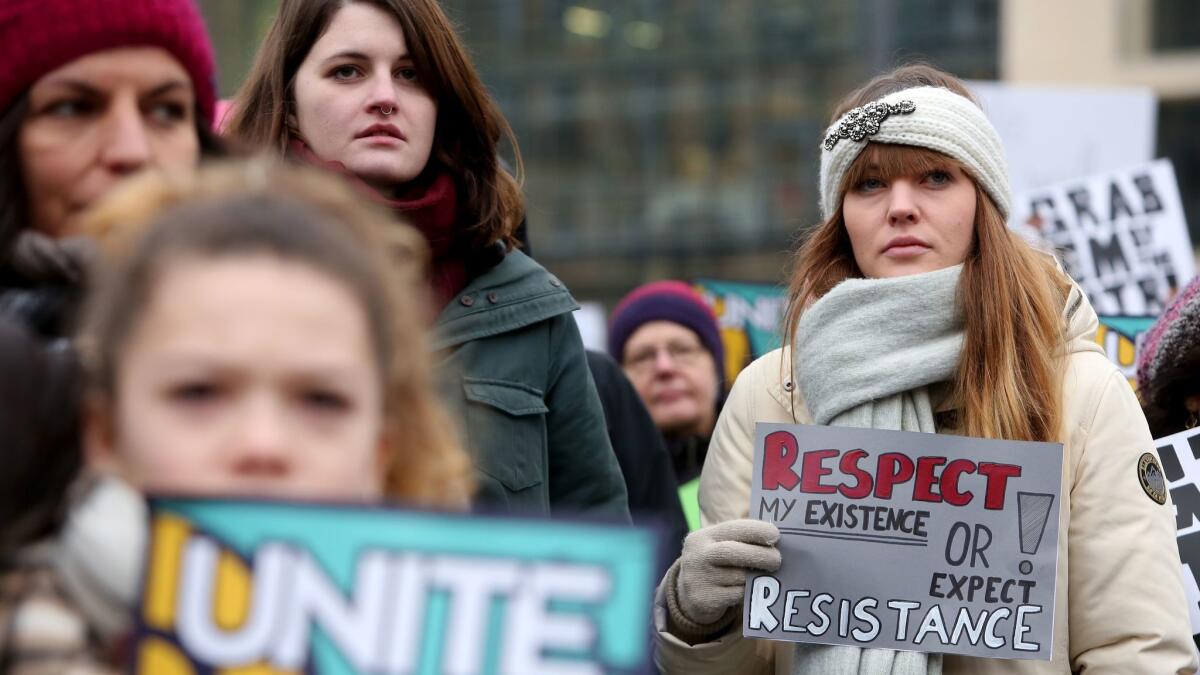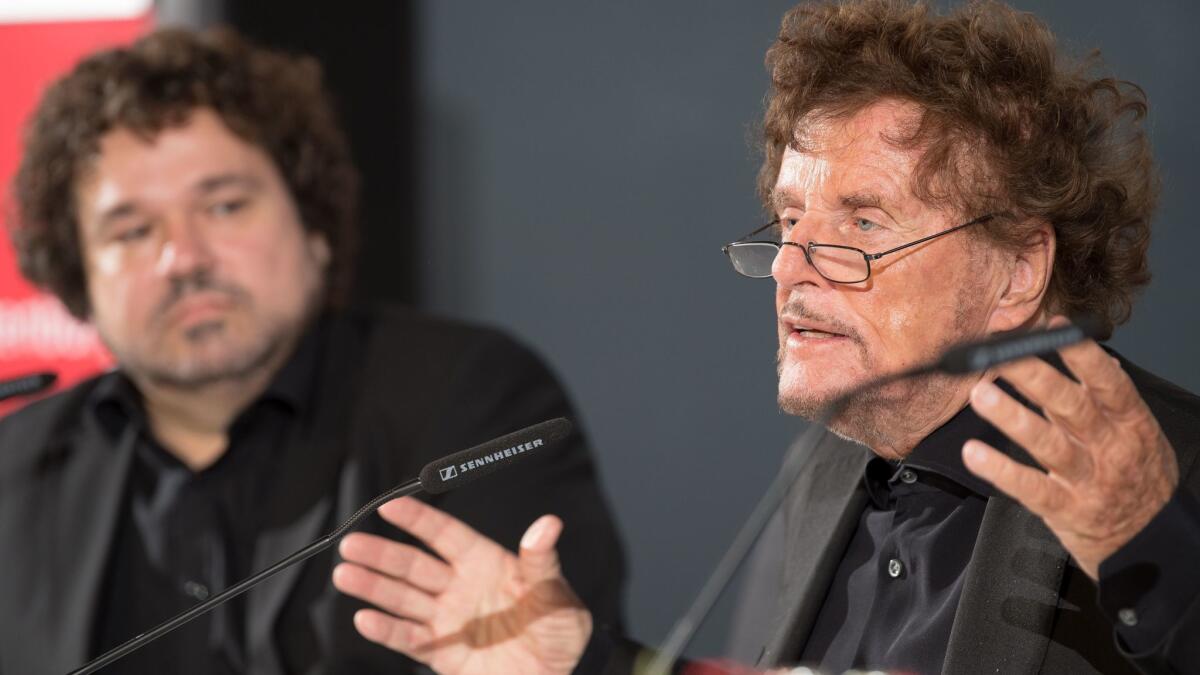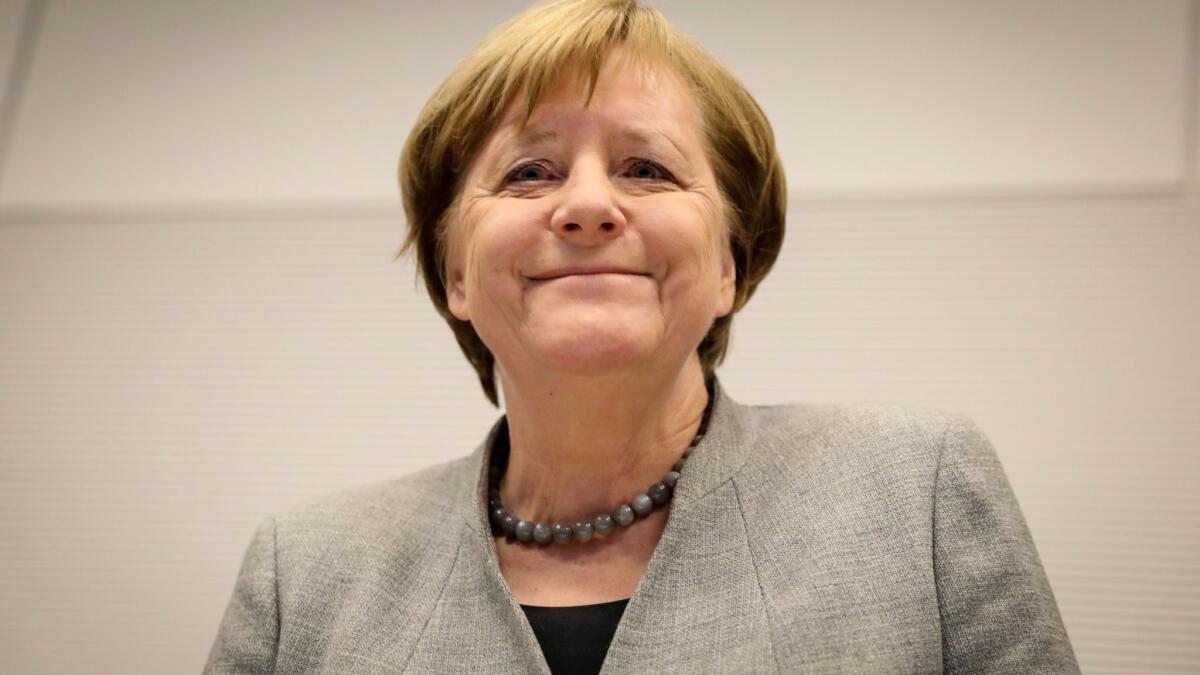Germany had seemed immune to the #MeToo movement. Then a prominent director was accused

- Share via
Reporting from Berlin — Even as the #MeToo and #TimesUp movements rippled across the United States and spread throughout parts of Europe, one major country remained noticeably quiet: Germany.
Some Germans thought their country might be immune to the social upheaval seen in the United States and elsewhere, even though there had long been whispers about sexual misconduct by powerful men here.
But that serenity was shattered recently when allegations of sexual assault involving one of the country’s most prolific film directors and screenwriters — 75-year-old Dieter Wedel — were reported in German media. The state prosecutor’s office in Munich has launched an investigation into reports that Wedel beat, raped or attempted to rape multiple women, mainly actresses, in the 1980s and ’90s.

Wedel has denied the allegations, even as the newspaper Die Zeit and other media have chronicled a growing number of women who have reported misconduct by him.
The sudden emergence of detailed sexual abuse allegations has raised questions about why sexual predators in Germany were not stopped sooner and why their misdeeds were covered up for so long.
Anke Domscheit-Berg, a member of Parliament for the Left Party and a leader on women’s issues, said she believes the Wedel case is just the tip of the iceberg in Germany and expects to see more reports in the months ahead about sexual misbehavior and crimes by powerful men. As a young business consultant, she said, she once had to fend off an unwanted advance from a client while her boss watched in silence.
“There are a lot of repeat offenders out there, and I hope they’re afraid now,” she said in an interview. “Until now, they could commit crimes without punishment. They ought to be scared now.”
Germany’s first such prominent case involving claims of long-covered-up sexual abuse came to light only recently, when Die Zeit published its investigation into Wedel. It came months after a New York Times report about movie producer Harvey Weinstein opened up a dialogue about sexual abuse in the United States.
The Grammys’ complicated relationship with the #MeToo and Time’s Up movements »
Wedel is a legendary figure in Germany, with a long string of hit TV miniseries from the 1990s and 2000s. Several of his accusers are women who starred in films he was directing for German public television networks. Wedel issued a statement denying the allegations, adding that he was “deeply shaken.” He nevertheless resigned as artistic director of the Bad Hersfeld Theater Festival. He is being treated for heart problems, his spokesman said.
An actress named Esther Gemsch was the star of a made-for-TV film Wedel was directing in 1980. She told Die Zeit that Wedel choked her with a scarf in a hotel room and bashed her head into the side of a bed before trying to rape her. She was taken to a hospital and so badly hurt that she couldn’t continue working on the film and had to be replaced.
The SR public broadcasting network has launched an investigation into why no action was taken nor further investigation launched at the time, even though documents recently found by Die Zeit in SR archives indicated the network was aware of the accusations of sexual misconduct. Ute Christensen, who took over Gemsch’s role in the film, also later reported being harassed by Wedel.
Then there is the question about why it took so much longer in Germany than elsewhere for such a case to come to light.

Jessica Gienow-Hecht, a professor of history and North American studies at the Free University in Berlin, said there are probably two main reasons. First, despite the fact that Germany is led by a woman, Chancellor Angela Merkel, there are far fewer women in positions of power in Germany than in the United States and other Western countries. Second, Germans have been showing an increasing reticence toward trends coming from the United States in recent years — and that has been exacerbated since President Trump’s election in 2016.
“There’s a greater skepticism toward things coming from the United States these days,” Gienow-Hecht said in an interview. “Politically, the German-American relationship is going through a very trying phase. There’s been an increased skepticism of cultural trends sweeping over the United States. That could certainly be part of the explanation: It’s like, ‘Is this just another American thing coming over?’ ”
Gienow-Hecht also pointed to studies that show Germany lags behind the rest of the European Union when it comes to women’s rights and the number of women in top management positions.
“Feminism in Germany has been lagging behind for the last 40 or 50 years,” she added. “It has not advanced as far, and #MeToo is in many ways an expression of power.”
Germany also has been relatively slow to modernize its laws against rape. It took until 1997 for Parliament to recognize rape in marriage as a crime. Polls have found that 40% of women in Germany report having experienced sexual or physical abuse.
Another German director, Simon Verhoeven, whose mother, Senta Berger, 76, has been a leading actress for decades, criticized Wedel and all those who protected him over the years, as well as the silence from all those in the film industry who knew of at least the broader outlines of his behavior.
“I am ashamed of the mechanisms of my industry that have allowed these sadists and brutal perpetrators of violence to rape women for decades and to torture people — protected by the silence of broadcasters, productions and filmmakers,” wrote Verhoeven, 45, in a Facebook post on Sunday. “I thank the brave women who have overcome their shame and have helped to expose this man. Late, yes. But better late than never.”
Katja Grieger, managing director of Germany’s Federal Assn. of Rape Crisis and Women’s Counseling Centers, said she hoped this would be a watershed moment in the country.
“I think it’s time to stop searching for possible mistakes made by women, such as why didn’t they call the police or why did she name names or why didn’t she name names? ... The focus here should be on the question: Why were there these structures that made sexual violence against women possible?”
Kirschbaum is a special correspondent.
ALSO
How dinner with a lesbian couple changed Angela Merkel’s position on same-sex marriage
Jonathan Klinsmann takes his first step away from his father’s shadow
A great deal on Nutella sends French shoppers into a frenzy
More to Read
Sign up for Essential California
The most important California stories and recommendations in your inbox every morning.
You may occasionally receive promotional content from the Los Angeles Times.










